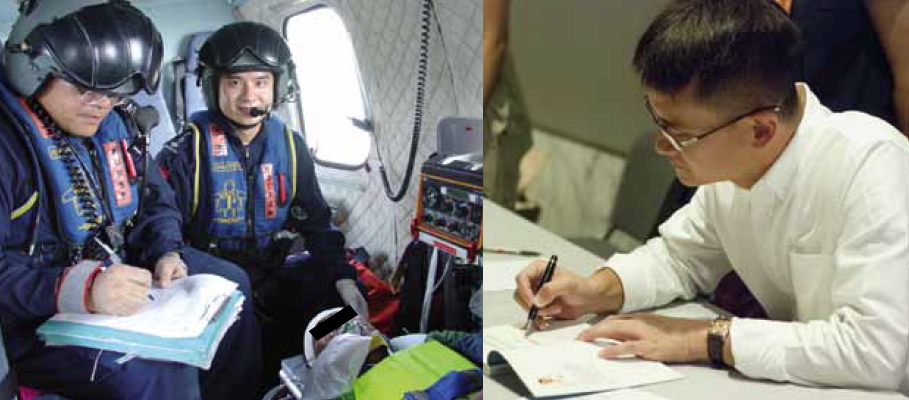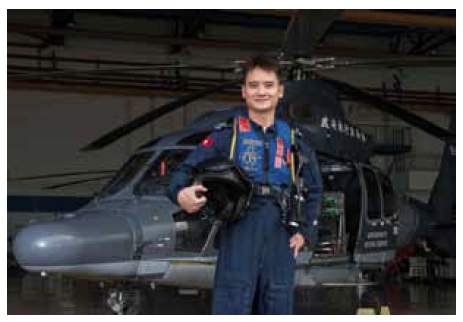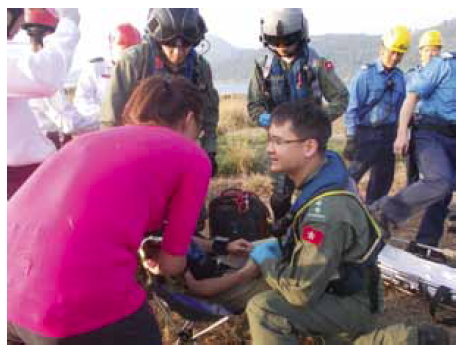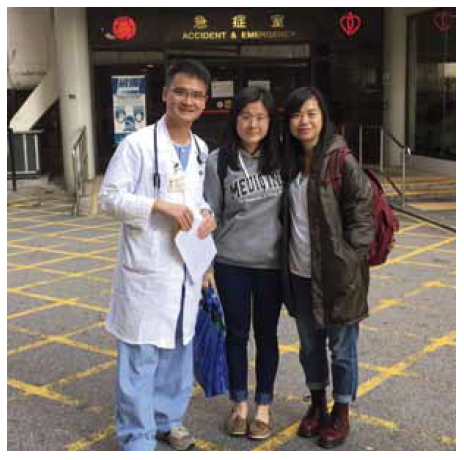© Hong Kong Academy of Medicine. CC BY-NC-ND 4.0
DOCTOR FOR SOCIETY
Investigating the investigator: probing into the
life of the “Sherlock Holmes of the AED”... and
more? An interview with Andrew Ho-yin Chung
Natalie KW Cheuk1; Caitlin HN Yeung2
1 Year 2, The University of Hong Kong
2 Year 1, The University of Hong Kong

(left) Dr Chung aboard in his clinic in the air (right) Writing a message for a reader at the Hong Kong Book Fair
When asked to name a notable polymath, the
fictional detective Sherlock Holmes immediately
comes to mind: a master of logical deduction, identity
changeover, and even evader of death. Leaving the
imaginary world of Holmes aside, one can draw
considerable similarities between the much-loved
detective and Dr Andrew Ho-yin Chung.
Dr Chung is currently an associate consultant
of the Accident and Emergency Department (AED)
in Queen Mary Hospital (QMH). He also serves as
an Air Medical Officer (Air MO) at the Government
Flying Service (GFS). In the meantime, he is active in
publications and is a social media luminary. One may
wonder how Dr Chung can possibly juggle so many
commitments with his heavy workload in the AED.
To decipher this enigma, we wove together pieces of
his life story over a fruitful afternoon of conservation,
out of which materialised a story of responsibility,
love, and excellence.
From humble beginnings
The beginning of Dr Chung’s relationship with
medicine can be traced back to his life-changing
childhood experience of losing a beloved family
member. It came as a bolt out of the blue for his good-natured
soul to witness the terrible grief of his usually
cheerful family. Logical reasoning is not bound by
age: if I could prevent death, he thought, they would
become happy again. As such, saving lives became his
lifelong aspiration.
Dr Chung was born into a grassroots family, for
which a day out to Ocean Park was an unaffordable
luxury. In retrospect, not only did his modest
upbringing equip him with the ability to resist the
temptation of wealth and power and focus on his
calling to save lives, but also intensified his love of
adventure. This may be the reason for his second
childhood dream—to become a pilot. Today, both of
his childhood dreams are fully realised in his day job
in the AED and his voluntary work with the GFS.
The pursuit of excellence in the rush of the accident and emergency department
In 1997, Dr Chung joined the AED in QMH, and was
instantly drawn to its detective work that requires one
to think on one’s feet to save lives from the verge of
death. In the AED, Dr Chung fully utilises his mental
agility to integrate knowledge across specialties and
his composure to make difficult decisions under
pressure. He soon realised that his decisions as an
emergency medicine doctor truly made a difference
to the most severely and acutely ill patients. Befitting
the momentous responsibilities of emergency
medicine doctors, Dr Chung is dedicated to excellent
health care through constant self-evaluation.
Beyond the emergency department, Dr Chung
tracks his patients’ progress to check his diagnosis in
the AED and sharpen his clinical acumen. He takes
a considered approach to diagnosis through careful
history taking and targeted physical examination
for greater cost-effectiveness and most importantly,
to save his patients the long wait and discomfort of
multiple investigations. His patients’ increasingly
favourable outcomes have been immensely fulfilling
and fuelled his drive for self-improvement.
Medic in the eye of the storm: life as an Air Medical Officer in the Government Flying Service
Dr Chung not only cares for his patients in the
confines of the hospital, but also “brings the AED to
the patient’s side”. In 2003, he combined his passion
for medicine and flying by joining the second batch
of Air MO at the GFS. Working with a small team
of two pilots, two air crewmen and a nurse, each
member punches above their weight, and Dr Chung
is no exception. His duties in the GFS include search
and rescue from an inshore location or offshore in
the South China Sea, case evacuation for patients
on outlying islands who require more intensive care,
and roadside rescue for accident sites accessible only
by helicopter. As only licensed doctors can prescribe
medicine under Hong Kong law—often essential
for the dying patient—Air MOs indeed make a vital
contribution to a GFS operation.
The helicopter is extremely austere in contrast
to the AED. The surrounding terrain and weather
is likely perilous, manpower is limited and so is the
on-board pharmacy and diagnostic equipment.
Without the benefit of predictive diagnostics, the Air
MO must simultaneously devise multiple detailed
management plans respective to diverse diagnostic
possibilities. The GFS stretches a doctor’s skills to
the limits and constantly challenges one to surpass
oneself. Consequently, Dr Chung’s experiences in
the GFS enhance his clinical sense and enable him to
make better decisions in his everyday practice.
A true advocate of lifelong learning, Dr Chung
also participates in Helicopter Underwater Escape
Training (HUET) in Singapore once every 3 years,
shown to increase helicopter passenger’s survival
rate from 15% to 93% in emergency ditching situations.
Over the course of 13 years in the GFS, Dr
Chung’s astute clinical sense has come to the pivotal
aid of numerous patients in over 300 missions, around
30 of which have been critically ill. Dr Chung vividly
remembers his rescue mission of an inebriated cyclist
found unconscious after drowning in the mountains
of Sai Kung. Upon arrival, the patient was in asystole
and had a cervical spine injury, all of which were
within Dr Chung’s expectations as a seasoned Air
MO. He immediately performed cardiopulmonary
resuscitation, intubation, and provided protection
for the patient’s neck and spine and successfully
resuscitated the patient with drugs. Doctors in
GFS can utilise more resources than the regular
emergency medical technician to greatly improve
survival prospects.
The poet of medicine: Sherlock Holmes of the emergency department
When Sherlock Holmes refuses to record and publish
the scintillating accounts of his adventures, John
Watson endeavours to do so for him. Thankfully, Dr
Chung himself is a lover of literature gifted in writing
charismatic prose, who delights his substantial online
and offline following with inspirational medical
narratives. In fact, literature also serves as a source
of inspiration for Dr Chung’s medical career. To
him, the connection between writing and medicine
is obvious: an author’s uncompromising attitude in
perfecting his craft parallels the commitment to
continuous self-improvement in a dedicated doctor.
Self-coined as “Sherlock Holmes of the AED”,
Dr Chung explained that Holmes was not merely
investigating crimes to make a living. Rather, he was
deeply invested in his work, evident in the courage and
persistence with which he established his celebrated
career. It is impossible to appreciate Holmes’
knowledge, experience, and insight in isolation from
his values and beliefs. Similarly, the doctor’s work is
an expression of his inner beliefs about his career and
life purpose, which has a direct bearing on the quality of
care that he delivers.
Dr Chung’s staunch resolve and commitment
to excellence has been paramount to his extensive
accomplishments. He is a best-selling author of two
books on anecdotes about his time in the AED as the
“Sherlock Holmes of the AED”《急症室的福爾摩斯》. His second book topped the Commercial Press
bestsellers list for the entire 2016 Book Fair. Youths
from all backgrounds, ranging from secondary
schools, medical and nursing schools, to prehospital
rescue teams, continuously send Dr Chung letters of
appreciation for his encouragement to pursue their
own passions and goals, and Dr Chung has even
befriended many of his fans in real life. Veritably, Dr
Chung’s words have touched the hearts of the masses
for good, much like the beloved Sherlock Holmes
novels.
Patient advocacy through writing
While no doubt pleased with the warm reception for
his books, it was neither the aim nor motivation for
him to embark on a writing career. “I wrote primarily
to promote the specialty to potential trainees and
encourage a more responsible attitude in medical
practice,” explained Dr Chung.
Realising the significant influence of the media
on public viewpoint, Dr Chung also uses writing
to increase interest in emergency medicine. As
Dr Chung saw it, the specialty in Hong Kong is
dangerously close to a watershed moment that may
be followed by an irreversible decline.
“Junior doctors are uninterested in the specialty
because of its exposure to high stress, difficult
work, long working hours, and its limited career
development opportunities in the private sector.
Doctors in the AED are now easily more than 5 years
apart in experience because of the poor retention
rate of trainees in the department, many of whom see
the AED merely as a stopover to training in a more
comfortable and lucrative specialty,” lamented Dr
Chung.
Dr Chung noted that the unique skills required
to manage a diverse array of medical emergencies—from poisonings to car accidents—make emergency
medicine specialists indispensable. Therefore, to
advocate for patient’s interests that are at stake, Dr
Chung is compelled to write tirelessly about his
passion for emergency medicine and the lives that it
has touched.
Making a life by what he gives—dedication to community service
His wide array of engagements certainly begs the
question: how does Dr Chung find the energy to
publish in addition to handling his heavy workload
in the AED and the GFS? “Writing energises me,” said
Dr Chung. “When you discover something that you
are truly passionate about, it enriches your life. Even
when I am writing in the darkness of the night or
sacrificing my leisure time, it is not energy depleting
but rather an experience of pure joy.”
Dr Chung also devotes his time to support
various public education initiatives. He has been
invited as a guest tutor in writing workshops such
as the “Little Writer Training Program” organised by
The Standing Committee on Language Education and
Research (SCOLAR) and Ming Pao. He has also been
invited to present awards for writing competitions.
He even returned as an alumnus to his high school
on Valentine’s Day to share a novel called “The Story
of Chasing Dreams”. On many occasions, he has
shared one of his core beliefs which is also found in
his writing: one must go the extra mile to realise one’s
dreams.
In a massive paradox, freedom is seemingly at
a historical low amidst the proliferation of material
wealth nowadays. For busy doctors, time is a scarce
commodity that sometimes undermines the quality of
medical care and saps their motivation to contribute
to health beyond their day job.
Dr Chung’s energetic and creative persona
resounds with the message that freedom is a choice,
not a given. For him, freedom comes from staying
in touch with his passion and love for humanity
and beauty—whether in the AED or the arts. His
distinguishing character trait is his deep self-understanding
and confidence to explore and seize
opportunities that allow him to exhibit his exceptional
talents and experiences.
To those who seek to chase the thrill of
frontline medicine, or who feel a moral sense of duty
to serve and protect in action, Dr Chung promises
that opportunities are bountiful. Of note, GFS
started recruiting new Air MOs in late February
2017 through the GFS website. This will definitely
be a great opportunity to serve the community by
providing immediate professional and expeditious
medical care to victims and casualties in the GFS.
Remarkably, Dr Chung is not only a writer or an
aircrewman beneath the white coat. Instead, his alter
egos are all integral parts of the same self, anchored
by the one unifying principle that underlies his life’s
work—one of responsibility, love, and commitment
to excellence.




